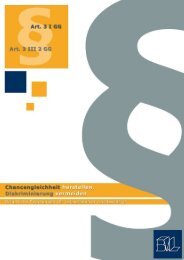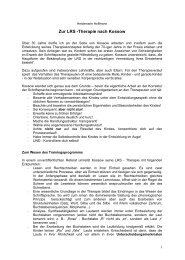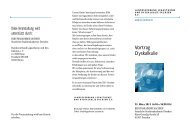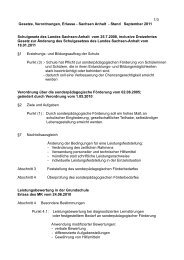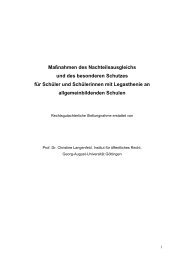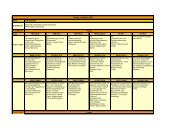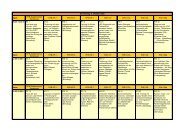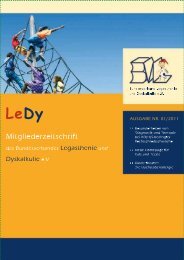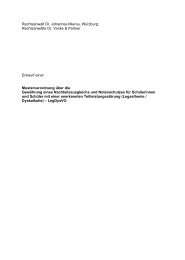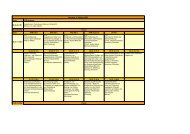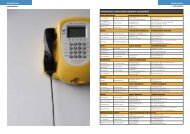Abstractband zum 16. Kongress des Bundesverbandes Legasthenie
Abstractband zum 16. Kongress des Bundesverbandes Legasthenie
Abstractband zum 16. Kongress des Bundesverbandes Legasthenie
Sie wollen auch ein ePaper? Erhöhen Sie die Reichweite Ihrer Titel.
YUMPU macht aus Druck-PDFs automatisch weboptimierte ePaper, die Google liebt.
<strong>16.</strong> <strong>Kongress</strong> <strong>des</strong> Bun<strong>des</strong>verban<strong>des</strong> <strong>Legasthenie</strong> <strong>Abstractband</strong><br />
Attentional deficits in developmental dyslexia: Experimental findings on lateralized<br />
attention and processing speed<br />
Prisca Stenneken (1), Johanna Egetemeir (1), Veronika Tanner (2),<br />
Gerd Schulte-Körne (3), Kathrin Finke (4)<br />
(1) Universität Bielefeld, Klinische Linguistik, Bielefeld, Deutschland<br />
(2) Catholic University Eichstädt-Ingolstadt, Eichstädt-Ingolstadt, Deutschland<br />
(3) Klinik und Poliklinik für Kinder- und Jugendpsychiatrie, Psychosomatik und Psychotherapie, Klinikum<br />
der Universität München, Deutschland<br />
(4) Neuro-cognitive Psychology Unit, Department of Psychology, Ludwig-Maximilians-University, Munich, Germany<br />
Impaired performance in tasks of visual attention has repeatedly been <strong>des</strong>cribed in<br />
persons with developmental dyslexia, and recent studies suggest that attentional deficits<br />
might causally contribute to developmental dyslexia (overview in Bosse, Tainturier &<br />
Valdois, 2008). The theoretical basis of the presents study is provided by the ‘theory of<br />
visual attention’ (TVA), a framework for deriving mathematically independent, quantitative<br />
measures of attentional components. Previous investigations applied this framework<br />
in whole and partial report tasks and have demonstrated its usability in providing a diagnostic<br />
tool for the assessment of attentional functions (e.g. Finke, et al., 2005). We used<br />
a whole-report and a partial-report paradigm in investigating of a group of adult dyslexics<br />
and a matched control group of normal readers. The report tasks allowed to estimate the<br />
following parametric values individually for all participants: perceptual processing speed,<br />
visual working memory storage capacity and the spatial distribution of attention. Stimuli<br />
were red or green letters, which were vertically or horizontally arranged in the left and<br />
right visual field and were briefly presented to the participants on a computer screen. The<br />
participants reported as many target stimuli as possible in an unspeeded manner. Possible<br />
reductions in the parametric values of the dyslexic group compared to the control<br />
group were taken as markers for the underlying deficit. Results demonstrated that the<br />
dyslexic deficit was mainly reflected in the processing speed and the spatial distribution<br />
of attention. The present findings are compatible with previous studies that identified<br />
subgroups of dyslexia characterized by an attentional deficit (e.g., Heim et al., 2008).<br />
Moreover, the parametric analyses contribute to a specific investigation of the nature of<br />
the attentional deficit in dyslexia.<br />
References:<br />
Bosse, M.-L., Tainturier, M. J., & Valdois, S. (2008). Developmental dyslexia: The visual<br />
attention span deficit hypothesis. Cognition, 104, 198–230.<br />
Finke, K., Bublak, P., Krummenacher, J., Kyllingsbæk, S., Müller, H. J. & Schneider, W. X.<br />
(2005). Usability of a theory of visual attention (TVA) for parameter-based measurement<br />
of attention I: Evidence from normal subjects. Journal of the International Neuropsychological<br />
Society, 11, 832–842.<br />
Heim, S., Tschierse, J., Amunts, K., Wilms, M., Vossel, S., Willmes, K., Grabowska, A. &<br />
Huber, W. (2008). Cognitive subrtypes of dyslexia. Acta Neurobiologiae Experimentalis,<br />
68, 73-82.<br />
Korrespondenzautor:<br />
Prisca Stenneken<br />
prisca.stenneken@uni-bielefeld.de<br />
0521 106 5324<br />
123



